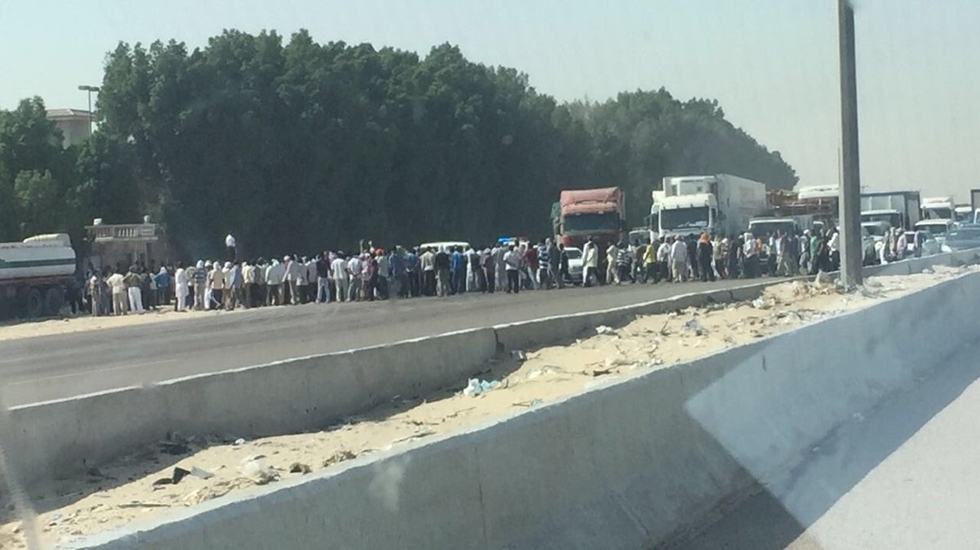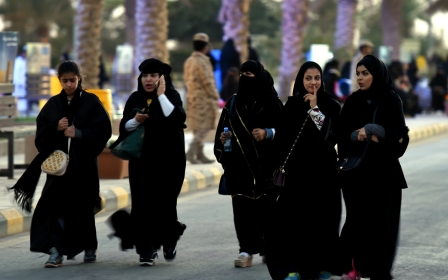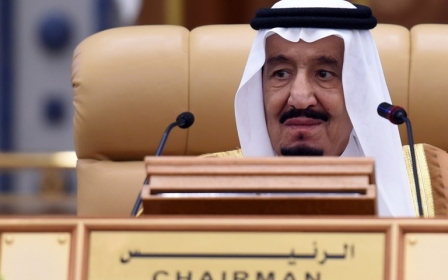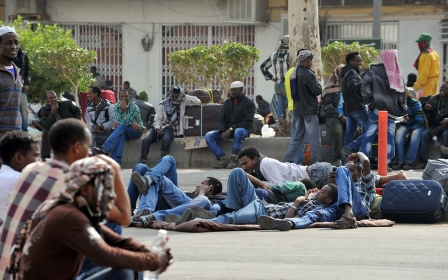Angry foreign staff block Saudi road in protest over missing pay

Scores of foreign staff at Saudi Arabian company the Saad Group blocked a road in the Eastern Province on Tuesday as part of a protest over not being paid in more than seven months.
Footage sent to MEE showed a large group of mainly Indian and Pakistani workers stopping traffic on the road that links the town of al-Hasa to the Eastern Province’s capital Dammam.
Saudi billionaire Maan al-Sanea owns the Saad Group, which made headlines last week when staff at one of its hospitals began an open-ended strike over not being paid since May.
On its website the Saad Group says it runs “diversified businesses” in the Gulf and has investments around the world.
The foreign workers striking on Monday have not been paid since February amid rumours that the company’s owner has been siphoning off money for himself rather than paying wages.
An American doctor at the Saad Specialist Hospital who is on strike said on condition of anonymity: “We think the owner is taking 600,000 riyals ($160,000) a day in cash out of the hospital."
Saad employees told MEE they do not understand where company revenues are being spent, as last month private healthcare firm Bupa paid the firm 13 million riyals ($3.7 million) in dues.
None of that money has been paid out in wages, workers told MEE.
“The cash just kind of disappears,” the American doctor said. “Nobody is really sure why there is an issue.”
The company's billionaire owner has drawn the ire of staff because of his continued lavish parties, for which he regularly flies in famous singers from around the world. The American doctor said the owner has planned another party for Tuesday evening.
"The owner is having parties while staff at his company can't feed their children or send them to school," the doctor said. "It is disgusting."
An official source told MEE last week that King Salman is eager to resolve the hospital's situation, and that local authorities in the Eastern Province have given the owner three options: he either fixes the problem, partners with another Saudi billionaire, or the government takes over the hospital.
Saudi Arabia is in the midst of a financial crisis because of a collapse in oil revenues that account for 80 percent of government income. On Tuesday the government announced that it was cutting ministerial and public sector salaries and slashing bonuses and perks in order to cut the budget deficit.
In 2015 the government posted a record $98bn budget deficit, causing many of the kingdom’s construction projects to be suspended or cancelled.
On Monday a second hospital in the Eastern Province went on strike as staff have not been paid since May. Doctors and nurses at the Dr Fakhry & Alrajhi Hospital in Khobar City blocked their clinic's corridors while holding signs calling for the owners to pay up.
Striking staff were unwilling to go on the record about their protest due to fears of being punished by authorities. However, one staff member on Tuesday told MEE on condition of anonymity that everyone at the hospital was paid after yesterday's strike action.
The employee said staff believe the delay in paying wages was down to the Ministry of Health not paying the owner for completed government work.
The hospital's owner is Saudi businessman Abdul Rehman Saleh Al-Rajhi. He also owns another private hospital in Khobar called Procare. No one from the either hospital responded to repeated requests for comment.
Staff at the Saad Specialist Hospital remain unpaid and told MEE they have continued with their strike action.
Public protests and strikes are banned in Saudi Arabia but unpaid workers across the kingdom have increasingly risked arrest by holding demonstrations and strikes amid desperate attempts to get their wages.
One Pakistani employee at the Riyadh-based construction firm United Seemac told MEE on Monday it has become a “do or die” situation for workers in the kingdom.
Kamran Bhatti, a designer from Islamabad who has worked in Saudi Arabia for five years, said he was moving from the south-east city of Khamis Mushait to the capital Riyadh to unite with other unpaid colleagues.
Despite the risk of arrest, Bhatti said workers are determined to get their money.
“There is no other option left and I really don’t know what will happen there [in Riyadh],” he said. “But I feel more of us will be in Riyadh and this will make us more united and more effective.”
New MEE newsletter: Jerusalem Dispatch
Sign up to get the latest insights and analysis on Israel-Palestine, alongside Turkey Unpacked and other MEE newsletters
Middle East Eye delivers independent and unrivalled coverage and analysis of the Middle East, North Africa and beyond. To learn more about republishing this content and the associated fees, please fill out this form. More about MEE can be found here.




